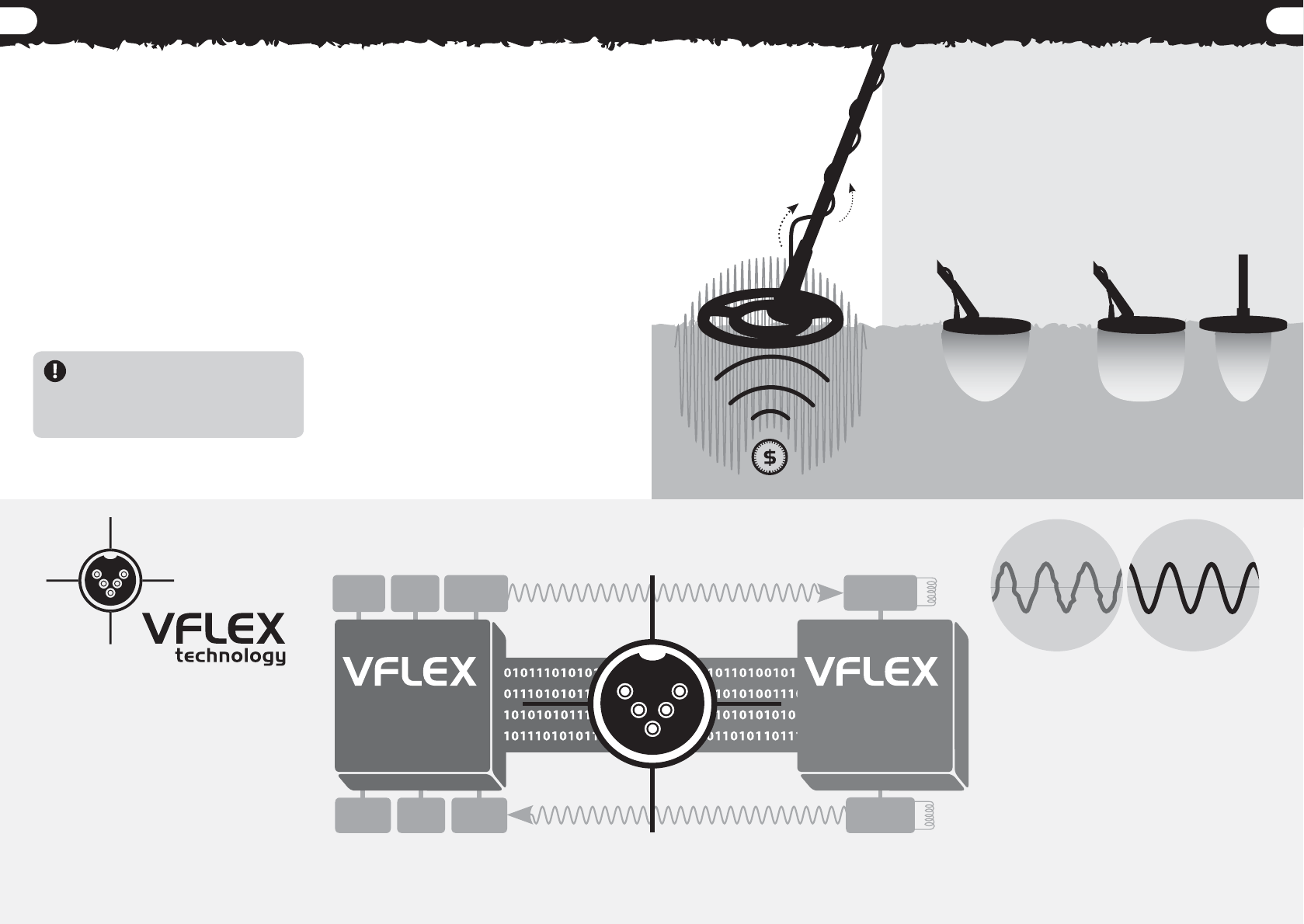
2
Metal detectors create an electro-
magnetic field, which penetrates the
ground. Because metal is conductive
it causes a change in this field. The
detector senses this change and sends
a signal back to the control box,
alerting the operator.
Metal detectors can determine the
size, shape and composition of metallic
objects beneath the coil. Typically,
the larger the object, the easier it is
to detect.
“BEEP!”
The X-Terra 70 uses a single frequency
(7.5kHz) as it’s standard operating frequency.
This frequency has the ability to penetrate
deep into the ground and is the most
suitable for general purpose detecting.
Being the the top model in the X-Terra
product range, the X-Terra 70 is capable
of operating at frequencies of 3kHz and
18.75kHz, depending upon the selection
of appropriate accessory coils (pg. 48, 51).
The X-Terra 70 has two main detecting
modes: Coin & Treasure Mode (pg.18)
for general purpose detecting and
Prospecting Mode (pg. 19) for detecting
gold nuggets and relics.
The specialised Prospecting Mode has
improved Sensitivity and adjustable Iron
Mask Discrimination. It is the ideal mode
when searching for gold nuggets, small
relics, and some types of jewellery.
The X-Terra detectors are Minelab’s fi rst products to
incorporate VFLEX Technology.
VFLEX uses state of the art digital and mixed-signal
components to enhance standard single frequency
technology by replacing most of the analogue circuitry
with digital signal processing. The small amount of
analogue circuitry still employed has been very carefully
designed and calibrated to obtain the outstanding
sensitivity, stability and repeatability required to match
the performance of the digital processing.
This radical departure from traditional approaches
to metal detector design has been made possible by
advances in electronics that power personal digital
assistants, cell (mobile) phones and high-fi delity
portable audio equipment.
Precision VFLEX Signal
Standard VLF Signal
(Without VFLEX)
Power
Supply
Audio
Transmit
LCD ReceiveKeypad
PRIMARY MICRO
(IN CONTROL BOX)
DIGITAL SIGNAL PROCESSING
(DSP)
CODEC SIGNAL CONVERSION
Analog Signal
Coil
Analog Signal
Transmit
Receive
SECONDARY MICRO
(IN COIL)
SENSING + TRANSMITTING
COIL TYPE, SIZE, FREQUENCY
Control Box
For the X-Terra user, this precision means dependable
performance and improved immunity to environmental
conditions such as ground mineralisation, electromagnetic
interference and temperature variations.
VFLEX requires coils that are accurately constructed
and calibrated. Every time the detector starts up, the
micro-controllers in the control box and the coil establish
communication through a digital data link.
Information about the coil is sent to the control box, so the
detector ‘knows’ what type of coil is attached and can set
the appropriate operating parameters.
This optimizes performance, and also makes the detector
‘future proof’, in that it will be capable of operating
at diff erent frequencies depending on the electronic
properties of the coil.
HOW DETECTORS WORK
3
The frequency of a detector is the
number of times a signal is transmitted
into the ground, per second (measured
in Hertz - Hz). 1000Hz = 1kHz.
The X-Terra 70 has two basic coil
configurations, each with its own benefits.
A Concentric coil is the
standard coil supplied
with the X-Terra 70 and is
an all purpose coil with
excellent pinpointing
capabilities.
Double D coils are available
as accessories. They provide
improved ground rejection
and have a different
detection profile.


















